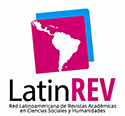Uma antropologia do 'parentesco na política'
Interesse, sujeito coletivo e parentesco nos sindicatos argentinos
Resumo
Neste artigo proponho uma antropologia do parentesco na política, entendida como uma análise que se debruça sobre as sobreposições cotidianas entre parentesco e política que ocorrem num determinado espaço político e suas implicações para a construção dos sujeitos políticos. Descrevo o lugar do parentesco nas delegações sindicais dos trabalhadores estatais na Argentina de três maneiras: primeiro, as linguagens de parentesco mobilizadas para descrever filiações e disposições políticas, especialmente a linguagem de herança; segundo, as relações familiares na entrada dos trabalhadores no Estado e na militância; e terceiro, as práticas de criação de parentesco (kinning) como relações (relatedness). A combinação desses três modos de parentesco cria o sindicato como um grupo de parentes e permite que eles atuem politicamente sobre o mundo com o objetivo de transformálo.Downloads
Referências
Alonso, A. M. (1994). The politics of space, time and substance: state formation, nationalism, and ethnicity. Annual Review of Anthropology, 23, 379-405.
Auyero, J. (2001). Poor people’s politics: Peronist survival networks and the legacy of Evita. Durham: Duke University Press.
Bear, L. (2007). Lines of the nation: Indian railway workers, bureaucracy, and the intimate historical self. Nueva York: Columbia University Press.
Bear, L. (2013). ‘This body is our body’: Vishwakarma Puja, the social debts of kinship, and theologies of materiality in a neoliberal shipyard. En S. McKinnon y F. Cannell (Eds.). Vital relations: modernity and the persistent life of kinship (pp. 155-178). Santa Fe, N.M.: School for Advanced Research Press.
Bodenhorn, B. (2013). On the road again: movement, marriage, mestizaje, and the race of kinship. En S. McKinnon y F. Cannell (Eds.). Vital relations: modernity and the persistent life of kinship (pp. 131-154). Santa Fe, N.M.: School for Advanced Research Press.
Bourdieu, P. y J.- C. Passeron (1977). Reproduction in education, society, and culture. Londres: Sage.
Carsten, J. (Ed.) (2000). Introduction: Culture of relatedness. En Cultures of relatedness: new approaches to the study of kinship (pp. 1-36). Cambridge: Cambridge University Press.
Carsten, J. (2004). After kinship. Cambridge: Cambridge University Press.
Carsten, J. (2013). Introduction: blood will out. Journal of the Royal Anthropological Institute (N.S.) Special Issue: Blood will out: essays on liquid trasfers and flows, S1-S23.
Christiano, T. (2015). Democracy. En The Stanford encyclopedia of philosophy. Recuperado de https://plato.stanford.edu/archives/spr2015/entries/democracy/
Collier, J. F. (1987). Gender and kinship: essays toward a unified analysis. Stanford: Stanford University Press.
Das, V. (2015). Ordinary ethics. En D. Fassin (Ed.). A companion to moral anthropology (pp. 133-149). Malden: Wiley-Blackwell.
Elena, E. (2011). Dignifying Argentina: Peronism, citizenship, and mass consumption. Pittsburgh: Pittsburgh University Press.
Eriksen, T. H. (2010). Ethnicity and nationalism: anthropological perspectives. Londres: Pluto Press.
Etchemendy, S. (2013). La ‘doble alianza’ gobierno-sindicatos en el kirchnerismo (2003-2012): orígenes, evidencias y perspectivas. En C. Acuña (Ed.). Instituciones gubernamentales y actores de la política argentina (pp. 291-324). Buenos Aires: Siglo XXI.
Etchemendy, S. y Collier, R. B. (2007). Down but not out: union resurgence and segmented neocorporatism in Argentina (2003-2007). Politics & Society, 35, 363-401.
Faubion, J. D. (2011). An anthropology of ethics. Cambridge: Cambridge University Press.
Forbess, A. y Michelutti, L. (2013). From the mouth of God: divine kinship and popular democratic politics. Focaal: Journal of Global and Historical Anthropology, 67, 3-18.
Fortes, M. (1969). Kinship and the social order: the legacy of Lewis Henry Morgan. Londres: Routledge & Kegan Paul.
Fortes, M. y Evans-Pritchard, E. (Eds.) (1940). African political systems. Londres: Oxford University Press for the International African Institute.
Foucault, M. (1990). The history of sexuality, vol. 3: The care of the self. Londres: Penguin.
Gluckman, M. (1965). The ideas in Barotse jurisprudence. New Haven: Yale University Press.
Halperin Donghi, T. (2012 [1994]). La larga agonía de la Argentina peronista. Buenos Aires: Ariel.
Herzfeld, M. (2007). Global kinship: anthropology and the politics of knowing. Anthropological Quarterly, 80, 313-323.
Hirschman, A. (1977). The passions and the interests: political arguments for capitalism before its triumph. Princeton: Princeton University Press.
Howell, S. (2006). Kinning of foreigners: transnational adoption in a global perspective. Oxford: Berghahn Books.
James, D. (1988). Resistance and integration: Peronism and the Argentine working class, 1946-1976. Cambridge: Cambridge University Press.
Keane, W. (2016). Ethical life: its natural and social histories. Princeton: Princeton University Press.
Korab-Karpowicz, W. J. (2017). Political realism in international relations. En The Stanford encyclopedia of philosophy. Recuperado de https://plato.stanford.edu/archives/sum2017/entries/realism-intl-relations/
Kuper, A. (2015). Anthropology and anthropologists: the British school in the twentieth century. Londres: Routledge.
Laidlaw, J. (2014). The subject of virtue: an anthropology of ethics and freedom. Cambridge: Cambridge University Press.
Lambek, M. (2010). Ordinary ethics: anthropology, language, and action. Nueva York: Fordham University Press.
Lambek, M. (2013). Kinship, modernity and the immodern. En S. McKinnon y F. Cannell (Eds.). Vital relations: modernity and the persistent life of kinship (pp. 241-260). Santa Fe, N.M.: School for Advanced Research Press.
Lazar, S (2015). Of autocracy and democracy, or discipline and anarchy: when organizational structure meets political ideology in Argentinean public sector trade unions. Political and Legal Anthropology Review (PoLAR), 38, 279-99.
Lazar, S (2019). ¿Cómo se construye un sindicalista? Vida cotidiana, militancia y afectos en el mundo sindical. Ciudad de Buenos Aires: Siglo XXI.
Levitsky, S. (2003). From labor politics to machine politics: the transformation of party-union linkages in Argentine Peronism, 1983-1999. Latin American Research Review, 38(3), 3-36.
Lomnitz, C. (1995). Ritual, rumor and corruption in the constitution of polity in modern Mexico. Journal of Latin American Anthropology, 1, 20-47.
MacCormack, C. P. y Strathern, M. (1982). Nature, culture, and gender. Cambridge: Cambridge University Press.
Malinowski, B. (1985 [1926]). Crimen y costumbre en la sociedad salvaje. Barcelona: Planeta Dagostini.
Malinowski, B. (1930). Kinship. Man, 30, 19-29.
Malloy, J. (1977). Authoritarianism and corporatism in Latin America. Pittsburgh: Pittsburgh University Press.
Manzano, V. (2013). La política en movimiento: movilizaciones colectivas y políticas estatales en la vida del Gran Buenos Aires. Rosario: Prohistoria.
McKinley, R. (2001). The philosophy of kinship: a reply to Schneider’s critique of the study of kinship. En R. Feinberg y M. Ottenheimer (Eds.). The cultural analysis of kinship: the legacy of David M. Schneider (pp. 131-167). Chicago: University of Illinois Press.
McKinnon, S. y Cannell, F. (Eds.) (2013a). Vital relations: modernity and the persistent life of kinship. Santa Fe, N.M.: School for Advanced Research Press.
McKinnon, S. y Cannell, F. (Eds.) (2013b). The difference kinship makes. En Vital relations: modernity and the persistent life of kinship (pp. 3-38). Santa Fe, N.M.: School for Advanced Research Press.
Pitt-Rivers, J. (1973). The kith and the kin. En J. Goody (Ed.). The character of kinship (pp. 89-106). Cambridge: Cambridge University Press.
Robbins, J. (2013). On kinship and comparison, intersubjectivity and mutuality of being. Hau: Journal of Ethnographic Theory, 3(2), 309-316.
Rosaldo, M. Z. y Lamphere, L. (1974). Woman, culture, and society. Stanford: Stanford University Press.
Sahlins, M. (2013). What kinship is – and is not. Chicago: Chicago University Press.
Schmitter, P. C. (1974). Still the century of corporatism? The Review of Politics, 36, 85-131.
Schmitter, P. C. (2006). Interests. European University Institute, Department of Political and Social Sciences.
Schneider, D. (1980). American kinship: a cultural account. Chicago: Chicago University Press.
Service, E. R. (1985). A century of controversy: ethnological issues from 1860 to 1960. Orlando: Academic Press.
Shever, E. (2012). Resources for reform: oil and neoliberalism in Argentina. Stanford: Stanford University Press.
Shever, E. (2013). ‘I am a petroleum product’: making kinship work on the Patagonian frontier. En S. McKinnon y F. Cannell (Eds.). Vital relations: modernity and the persistent life of kinship (pp. 85-108). Santa Fe, N.M.: School for Advanced Research Press.
Stasch, R. (2009). Society of others: kinship and mourning in a West Papuan place. Berkeley: University of California Press.
Stoler, A. L. (2002). Carnal knowledge and imperial power: race and the intimate in colonial rule. Berkeley: University of California Press.
Strathern, M. (2015). Axioms of amity: a tribute. Presentación en el workshop ‘The Legacies of Meyer Fortes’, Trinity College, Cambridge. Inédito.
Torre, J. C. (1998). The ambivalent giant: the Peronist labor movement, 1945-1995. En J. Brennan (Ed.). Peronism and Argentina (pp. 125-140). Wilmington: Scholarly Resources.
Torre, J. C. (2012). Ensayos sobre movimiento obrero y peronismo. Buenos Aires: Siglo XXI.
Wade, P., García Deister, V., Kent, M., Olarte Sierra, M. F. y Díaz del Castillo Hernández, A. (2014). Nation and the absent presence of race in Latin American genomics. Current Anthropology, 55, 497-522.
Weber, M. (1968 [1922]). Economy and society: an outline of interpretive sociology. Nueva York: Bedminster Press.
Wiarda, H. (2005). Authoritarianism and corporatism in Latin America – revisited. Gainsville: University Press of Florida.
Wolanski, S. (2015). La familia telefónica: sobre las relaciones de parentesco en la política sindical. Cuadernos de Antropología Social, 42, 91-107.
Yanagisako, S. (2002). Producing culture and capital: family firms in Italy. Princeton: Princeton University Press.
Yanagisako, S. (2013). Transnational family capitalism: producing ‘Made in Italy’ in China. En S. McKinnon y F. Cannell (Eds.). Vital relations: modernity and the persistent life of kinship (pp. 63-84). Santa Fe, N.M.: School for Advanced Research Press.
Yanagisako, S. y Collier, J. F. (Eds.) (1987). Toward a unified analysis of gender and kinship. En Gender and kinship: toward a unified analysis (pp. 14-50). Stanford: University Press.

Runa, archivos para las ciencias é uma publicação do Instituto de Ciencias Antropológicas, Facultad de Filosofía y Letras, Universidad de Buenos Aires e é distribuída sob o título Creative Commons Attribution 4.0 International License.
Runa mantém o seu compromisso com as políticas de Acesso Aberto à informação científica, considerando que tanto as publicações científicas como a investigação financiada com fundos públicos devem circular livremente na Internet, gratuitamente e sem restrições.
Os conteúdos e opiniões expressos nos artigos publicados são da exclusiva responsabilidade dos seus autores.



















